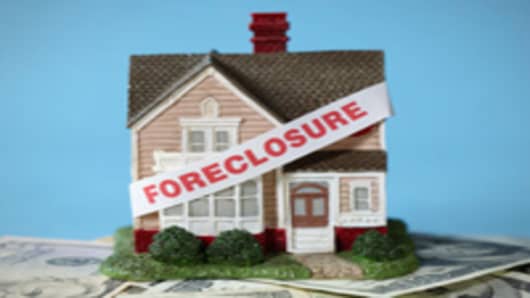Now that all fifty states have launched a joint investigation into fauxclosuregate, it’s probably time to soberly address the fact that nearly everyone who has been ‘victimized’ by robo-signers and foreclosure mills is in default on their home loans.
I know there are cases—or at least, one case—where people have been wrongfully foreclosed upon. But there is little evidence that banks are engaged in any systemic practice of throwing people who do not have mortgages or are current on their mortgages out of their homes.
The typical person who is fighting foreclosure on “show me the note” grounds is someone who has stopped making payments on their mortgage but refuses to surrender their house to the bank. Some of them may not even be suffering from financial hardship—other than having taken on debt that they cannot afford.
Earlier this week, CNN Money told the tale of a woman from Wappinger Falls, New York named Replique D'Amelio. She owes just under $400,000 on her mortgage, which is currently underwater. Even at the height of the housing boom, however, $400,000 would have bought you a very nice place in Wappinger Falls.
CitiMortgage modified D’Amelio’s mortgage but she defaulted anyway. Now she claims that Citi cannot foreclose upon her because Fannie Mae is the owner of her mortgage. Her lawyer argues that the mortgage was improperly assigned to Citi, and is contesting the foreclosure on those grounds.
Let’s grant D’Amelio not only the facts but also her interpretation of foreclosure law. Perhaps Citi, which purchased the mortgage in late 2006 and sold it to Fannie Mae in early 2007, shouldn’t be able to foreclose. Maybe the MERS system somehow vitiated any security interest attached to her house through the mortgage.
This doesn’t change the fact that D’Amelio is attempting to stay in a house while reneging on her obligation to repay the loan she used to buy the home. The fact that her mortgage is owned by Fannie Mae actually makes her default uglier. Her refusal or inability to pay is inflicting losses on a mortgage company that is owned by the government and funded by tax-payers.
There’s nothing in the story that paints a picture of financial hardship here—she might be just strategically defaulting. She could be a new breed of Super-Strats—borrowers who default but don’t walk away. They stay and fight.
None of this excuses the actions of banks that falsified affidavits, did not properly transfer mortgage notes and lien documents, forged documents, and sold shoddily securitized mortgages to investors. But the wronged party in these situations is not the defaulting borrower—it’s the investors in the banks, the courts, the buyers of the securities, and the broader American public.
It’s actually a bit sickening to hear defaulted borrowers describing the misdeeds of banks as “mortgage fraud.” What some banks have done might well be fraud—but the fact of that fraud doesn’t erase the other fact that the borrower agreed to make payments or face the penalty of losing her home.
"These companies that are too big to fail apparently also think they're also too big to comply with the law of the land and it's beyond outrageous," D’Amelio’s lawyer tells CNNMoney.
Maybe I’ve missed something here. Can someone please explain why banks being ‘too big to fail’ should mean that D’Amelio should get to live in a house she hasn’t paid for?
Questions? Comments? Email us atNetNet@cnbc.com
Follow John on Twitter @ twitter.com/Carney
Follow NetNet on Twitter @ twitter.com/CNBCnetnet
Facebook us @ www.facebook.com/NetNetCNBC



